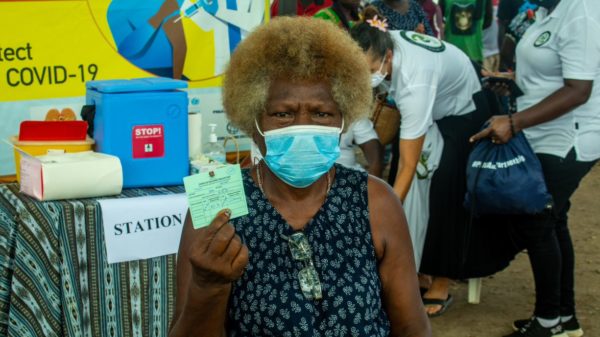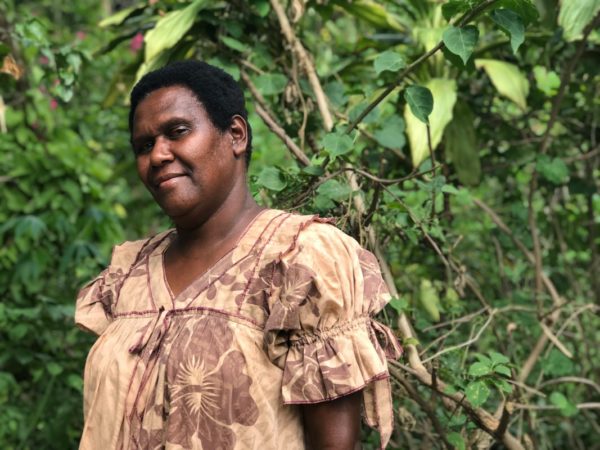Crises affect women, girls, boys and men differently with women and girls often suffering the most during humanitarian emergencies. Even though women are the first to respond when crisis hits to ensure their families and communities are safe and have food and shelter. When women lead emergency response more lives are saved. Despite this, women’s needs during an emergency are too often overlooked, jeopardising their rights and security.
If women are excluded from disaster preparedness and response, then whole communities are denied the best possible humanitarian response.
Since 2017, ActionAid Australia’s emergencies fund, the Arise Fund, has trained over 30,000 women in disaster preparedness and response impacting the lives of over 2.5 million people experiencing conflict and disasters around the world.
Every time there is a humanitarian crisis, women are on the frontlines leading emergency responses in their community. These are just a few of the incredible Pacific women we’ve worked with who have led their community through crises in 2021.
Agnes Titus, Bougainville

Agnes Titus was the first woman in Bougainville to be vaccinated against COVID-19.
As the first women in Bougainville to be vaccinated against COVID-19, Agnes is dedicated to ensuring that accurate COVID-19 and vaccine messages are reaching vulnerable groups. She is the driving force behind Meri Gat Pawa, Meri Gat Infomesen Project (MGI), a joint initiative of ActionAid and local partners that is spearheading locally led and inclusive COVID-19 response across PNG and Bougainville.
“The most important thing right now is for people to get vaccinated, that is what we need to happen…Misinformation is the biggest challenge we are facing here in Bougainville. The situation is serious and accurate information is not reaching remote communities. As women leaders we have an important role to play,” says Agnes.
Through working with local women leaders, the project has developed a series of lifesaving COVID-19 health messages, which enhance COVID-19 awareness and address vaccine hesitancy. So far, more than 5 million SMS on COVID-19 prevention and human rights have reached Digicel subscribers in PNG’s National Capital District and Bougainville, as well as nine other provinces.
Carolyn Kitione, Fiji
Through the Young Women and Climate Change Project (YW&CC), Carolyn has helped create a space where women can come together to shift the power in disaster preparedness and climate change advocacy in the Pacific. By championing Pacific young women’s leadership, Carolyn has been able to support diverse young women from seven Pacific Island countries to become weather ready and climate smart.
“Young women are showing they are not the leaders of tomorrow because they are out their leading today.” says Carolyn Kitione, Regional Young Women Focal Point for the Shifting the Power Coalition, “we are telling you when systems are not working for us. We are telling you to work with us. If we want sustainability in our approaches, we need to start by ensuring there are a diversity of voices in the room where the decisions are being made on how to respond [to the climate crisis].”
Leiwia Yavions, Vanuatu

Leiwia is a WITTT mobiliser in Vanuatu.
After her community was hit by cyclone Pam, Leiwia joined the Women I Tok Tok Tugeta (WITTT) network. The network, supported by the Australian Government Department of Foreign Affairs and Trade, offers women a space to get support, have their voices heard and collaborate to plan future emergency preparation and response plans.
“A lot of disasters are coming as the climate changes. If we come together, mobilise together, talk about those issues… WITTT can help Erromango [island],” Leiwia said.
Leiwia has now led her community in Vanuatu through floods, cyclones, volcanic ashfall and COVID-19. And along the way, she’s challenging gender norms by showing what women are capable of.
Helena Seneka, PNG
Young women like Helena are already experiencing first-hand the impacts of climate change from an increased frequency of extreme weather events to rising sea levels, she is seeing livelihoods, food security and gender equality coming under threat.
Helena, a member of the Young Women Christian Association, Papua New Guinea (PNG) is working with ActionAid and Shifting the Power Coalition to build a movement of young women leaders to drive climate action.
“We believe that we can mobilise, educate, enable and empower young women to take an inclusive approach to influence climate change policies, programs and services,” says Helena.
Women in the Pacific are the frontlines of emergencies, leading their community through current and future crises. Donate today to support ActionAid’s work with women like Helena, Carolyn, Leiwia and Agnes.